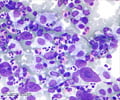Patients with chronic lymphocytic leukemia (CLL) have very high value for medicines that deliver the longest progression-free survival (PFS).

‘Cost may not play a key role for patients with chronic lymphocytic leukemia (CLL) to chose between different treatments available.’





The study also suggests that factoring out-of-pocket costs into this decision-making process may significantly influence a patient's choice of treatment.The most prevalent form of leukemia, CLL affects approximately 130,000 people in the United States, and more than 20,000 new cases are diagnosed each year. As more treatment options have been approved in recent years, each with its own associated benefits, side effects, and price tag, patients are forced to weigh many factors when determining their treatment plan.
To gain insight into how patients with CLL balance these differences, lead study author Carol Mansfield, PhD, of RTI Health Solutions, collaborated with the Leukemia & Lymphoma Society, the Lymphoma Research Foundation, and Genentech to conduct a survey among 384 people with CLL.
In this discrete choice experiment, patients were asked to choose between hypothetical treatment options, each of which was defined by five variable attributes progression-free survival, mode of administration, typical severity of diarrhea, chance of serious infection, and chance of organ damage.
"While every patient wants the most effective drug with the fewest side effects, most people don't have that option available," said Dr. Mansfield. "By asking patients to make tradeoffs and rank their preference, we can form an understanding of how patients approach their treatment."
Advertisement
On average, a gain in 36 months of progression-free survival was needed for patients to accept a 30 percent risk of serious infection. Least important to respondents was the mode of administration: patients were only willing to trade a few months of efficacy for a more convenient dosing method (oral administration).
Advertisement
"A successful outcome can be different from one individual to the next, and the outcome they desire depends on their circumstances."
When the researchers conducted a supplemental cost analysis, they found that out-of-pocket cost had a dramatic impact on the choices respondents made. In a follow-up question giving participants the choice between two medicines with different costs, up to 65 percent of respondents changed their choice of medicine.
"We used the results from the discrete-choice experiment to forecast the probability that a respondent would pick each hypothetical drug without any mention of cost and then compared that to the choices people made when out-of-pocket costs for these medicines were included," said Dr. Mansfield.
"Cost is clearly something that has an impact. When patients get prescribed something they can't afford, they have to make very difficult choices."
Ultimately, findings from discrete-choice experiments like this one will help doctors and patients focus on treatments that account for a patient's unique circumstances and goals. "Patients don't always know that they could be making these tradeoffs," said Dr. Mansfield.
"We hope that our findings can help doctors to have frank discussions with their patients about the differences between treatments and how these might affect their lives."
Source-Eurekalert













